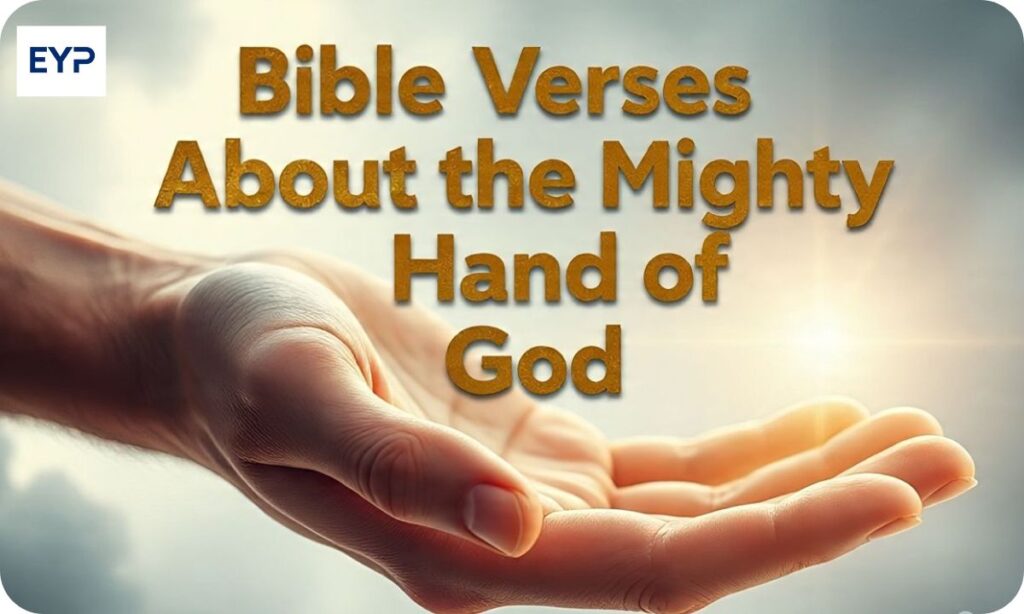The mighty hand of God, a recurring image in scripture, vividly portrays His supreme power, provision, and protection across generations. From Exodus 15:6, where God’s right hand shatters enemies, to John 10:28, where Jesus’ hand ensures eternal security, these verses reveal God’s sovereignty in delivering His people, whether from Egypt’s oppression or spiritual bondage.
Psalms like 89:13 and 118:15 celebrate His exalted strength, while Acts 4:30 and 13:11 show His hand empowering the early church and enacting judgment. In 2025, reflecting on verses like Isaiah 41:13 and Deuteronomy 33:27 reminds believers of God’s enduring support, guiding and uplifting through every trial.
The Creation and Sovereignty of God’s Mighty Hand
Genesis 1:1
“In the beginning God created the heavens and the earth.”
- Sovereign Act of Creation: This verse establishes God as the sole creator of all existence, initiating the universe with intentionality and authority.
- Timeless Beginning: The phrase “in the beginning” signifies that God exists outside of time, creating the framework of time itself.
- Comprehensive Scope: The “heavens and the earth” encompass all physical and spiritual realms, highlighting the vastness of God’s creative power.
- Foundation of Faith: This verse sets the theological foundation for understanding God’s relationship with the world and humanity’s place within it.
- Purposeful Creation: The act of creation reflects God’s purposeful design, implying order and meaning in the universe from its inception.
Psalm 95:4-5
“In his hand are the depths of the earth, and the mountain peaks belong to him. The sea is his, for he made it, and his hands formed the dry land.”
- God’s Ownership: The verse emphasizes that every part of the earth—depths, peaks, seas, and land—belongs to God as its creator.
- Divine Craftsmanship: God’s hands actively shaped the world, indicating personal involvement and care in creation’s design.
- Comprehensive Dominion: From the deepest valleys to the highest mountains, all creation is under God’s sovereign control.
- Celebration of Nature: The imagery invites worship, as the natural world reflects God’s glory and power, encouraging gratitude.
- Unity of Creation: The verse connects diverse elements (sea, land, depths, peaks) as unified under God’s creative authority.
Isaiah 40:12
“Who has measured the waters in the hollow of his hand, or with the breadth of his hand marked off the heavens? Who has held the dust of the earth in a basket, or weighed the mountains on the scales and the hills in a balance?”
- God’s Immensity: The verse uses poetic imagery to show God’s vastness, portraying Him as capable of holding all creation in His hand.
- Precision in Creation: Measuring waters and heavens suggests God’s meticulous design and control over the universe’s structure.
- Incomparable Power: Rhetorical questions emphasize that no one but God could accomplish such feats, highlighting His uniqueness.
- Humility of Humanity: The scale of God’s actions contrasts with human limitations, encouraging awe and dependence on Him.
- Order of Creation: The imagery of weighing mountains and hills reflects a purposeful, balanced design in the natural world.
Job 26:7-8
“He spreads out the northern skies over empty space; he suspends the earth over nothing. He wraps up the waters in his clouds, yet the clouds do not burst under their weight.”
- Cosmic Sovereignty: God’s ability to suspend the earth and skies over nothing showcases His power over the cosmos.
- Mystery of Creation: The verse highlights the incomprehensible nature of how God sustains the earth without visible support.
- Control Over Elements: Wrapping waters in clouds demonstrates God’s command over natural forces, maintaining their balance.
- Poetic Wonder: The imagery evokes awe at the delicate yet powerful way God manages creation’s complexities.
- Faith in the Unseen: The verse points to God’s invisible yet active role in upholding the universe, encouraging trust in His providence.
Psalm 8:3-4
“When I consider your heavens, the work of your fingers, the moon and the stars, which you have set in place, what is mankind that you are mindful of, human beings that you care for?”
- Majesty of Creation: The heavens, moon, and stars reflect God’s creative artistry, described as the work of His “fingers.”
- Human Insignificance: The vastness of the cosmos contrasts with humanity’s smallness, prompting humility.
- God’s Care for Humanity: Despite human insignificance, God’s mindfulness and care for people reveal His love and grace.
- Personal Reflection: The psalmist’s contemplation invites readers to marvel at creation and God’s relational nature.
- Purposeful Design: The stars “set in place” suggest an intentional, ordered universe, reflecting God’s purposeful plan.
Nehemiah 9:6
“You alone are the Lord. You made the heavens, even the highest heavens, and all their starry hosts, the earth and all that is on it, the seas and all that is in them. You give life to everything, and the multitudes of heaven worship you.”
- God’s Uniqueness: The verse declares God as the sole creator, distinguishing Him from all other powers or deities.
- Scope of Creation: From the highest heavens to the earth and seas, God’s creative work encompasses all realms.
- Source of Life: God is the life-giver, sustaining every living thing, from earthly creatures to heavenly beings.
- Universal Worship: The “multitudes of heaven” worshiping God highlights creation’s response to His glory.
- Affirmation of Faith: The verse is a communal declaration of God’s sovereignty, used in Israel’s worship and repentance.
Psalm 104:5-6
“He set the earth on its foundations; it can never be moved. You covered it with the watery depths as with a garment; the waters stood above the mountains.”
- Stability of Creation: The earth’s unmovable foundations reflect God’s enduring and reliable design.
- Creative Process: Covering the earth with waters suggests a deliberate, artistic act in shaping the world.
- God’s Authority: The imagery of waters standing above mountains shows God’s control over chaotic forces.
- Dynamic Creation: The verse hints at the transformative stages of creation, with waters receding to form land.
- Praise for Order: The psalm celebrates God’s ability to bring order and stability to the natural world.
Jeremiah 10:12
“But God made the earth by his power; he founded the world by his wisdom and stretched out the heavens by his understanding.”
- Power in Creation: God’s immense power is the source of the earth’s existence, emphasizing His omnipotence.
- Wisdom’s Role: The world’s foundation reflects divine wisdom, suggesting a purposeful and intelligent design.
- Heavens’ Expanse: Stretching out the heavens indicates God’s ability to create vast, complex systems.
- Contrast with Idols: In context, the verse contrasts God’s true creative power with the futility of man-made idols.
- Holistic Attributes: Power, wisdom, and understanding together highlight God’s multifaceted nature in creation.
Psalm 33:6
“By the word of the Lord the heavens were made, their starry host by the breath of his mouth.”
- Power of God’s Word: The heavens were created by God’s spoken word, showing His authority through speech alone.
- Simplicity of Creation: The “breath of his mouth” suggests effortless creation, highlighting God’s limitless power.
- Starry Host: The mention of stars emphasizes the grandeur and beauty of the celestial realm God created.
- Worshipful Tone: The verse is part of a psalm of praise, inviting awe at God’s creative acts.
- Divine Intent: Creation by God’s word implies intentionality, with every element purposefully formed.
Isaiah 48:13
“My own hand laid the foundations of the earth, and my right hand spread out the heavens; when I summoned them, they all stood up together.”
- Personal Involvement: God’s “own hand” and “right hand” emphasize His direct role in creating the universe.
- Dual Creation: The verse highlights both the earth and heavens as products of God’s singular creative act.
- Authority Over Creation: God’s summoning of creation, which “stands up together,” shows His absolute command.
- Unity of Creation: The earth and heavens responding together suggest a harmonious, interconnected design.
- God’s Faithfulness: In context, the verse underscores God’s reliability, as His creative power assures His promises.
God’s Mighty Hand in Deliverance and Protection
Exodus 3:20
“So I will stretch out my hand and strike the Egyptians with all the wonders that I will perform among them. After that, he will let you go.”
- God’s Mighty Hand: The verse emphasizes God’s powerful intervention, using His “hand” to perform wonders, symbolizing divine authority.
- Divine Judgment: The “wonders” are miraculous acts of judgment against Egypt, showcasing God’s justice against oppression.
- Purposeful Deliverance: God’s actions are aimed at securing Israel’s freedom, demonstrating His commitment to His people.
- Supernatural Power: The miracles (plagues) are extraordinary, proving God’s sovereignty over nature and human affairs.
- Foreshadowing Redemption: This verse anticipates Israel’s exodus, a key event symbolizing God’s redemptive power.
Deuteronomy 7:19
“You saw with your own eyes the great trials, the signs and wonders, the mighty hand and outstretched arm, with which the Lord your God brought you out. The Lord your God will do the same to all the peoples you now fear.”
- Eyewitness Testimony: Israel’s firsthand experience of God’s miracles in Egypt reinforces their trust in His power.
- God’s Mighty Acts: The “signs and wonders” and “mighty hand” highlight God’s unparalleled strength in delivering His people.
- Assurance for the Future: God’s past faithfulness guarantees His continued protection against future enemies.
- Conquering Fear: The verse encourages Israel not to fear other nations, as God’s power will overcome them as it did Egypt.
- Covenant Faithfulness: God’s actions are tied to His covenant, ensuring His ongoing commitment to Israel.
Psalm 136:12
“With a mighty hand and outstretched arm; His love endures forever.”
- God’s Strength: The “mighty hand and outstretched arm” symbolize God’s unstoppable power in delivering Israel from Egypt.
- Enduring Love: The refrain “His love endures forever” ties God’s powerful acts to His eternal, covenantal love.
- Historical Context: This verse recalls the exodus, a defining moment of God’s intervention in Israel’s history.
- Praise and Worship: The psalm’s repetitive structure invites communal gratitude for God’s mighty deeds.
- Balance of Power and Mercy: God’s strength is paired with His mercy, showing both His might and His care.
Isaiah 41:10
“So do not fear, for I am with you; do not be dismayed, for I am your God. I will strengthen you and help you; I will uphold you with my righteous right hand.”
- Command Against Fear: God’s presence eliminates the need for fear, offering comfort in times of distress.
- Divine Presence: The promise “I am with you” underscores God’s personal involvement with His people.
- Strength and Support: God pledges to provide strength and help, ensuring His people’s resilience.
- Righteous Right Hand: The “righteous right hand” symbolizes God’s just and powerful support for His people.
- Encouragement for Exile: In context, this verse reassures Israel during their exile, affirming God’s faithfulness.
Joshua 4:24
“He did this so that all the peoples of the earth might know that the hand of the Lord is powerful and so that you might always fear the Lord your God.”
- Global Witness: God’s mighty acts (like parting the Jordan) are meant to display His power to all nations.
- God’s Powerful Hand: The “hand of the Lord” signifies His unmatched strength in performing miracles.
- Promoting Reverence: The verse calls Israel to fear (revere) God, fostering a lifestyle of worship and obedience.
- Memorial Purpose: In context, the verse is tied to the memorial stones, reminding future generations of God’s deeds.
- Universal Impact: God’s actions are both for Israel’s benefit and to proclaim His glory to the world.
1 Kings 8:42
“For they will hear of your great name and your mighty hand and your outstretched arm—when they come and pray toward this temple.”
- God’s Renown: The verse highlights God’s fame, as His mighty deeds spread His reputation among the nations.
- Mighty Hand and Arm: These symbolize God’s power in delivering Israel, particularly in the exodus.
- Temple as Focal Point: The temple is a place of prayer where even foreigners can encounter God’s power.
- Inclusivity of Worship: The verse suggests that God’s blessings extend to all who seek Him, not just Israel.
- Historical Context: Spoken during Solomon’s temple dedication, it reflects God’s desire to be known globally.
Daniel 3:17
“If we are thrown into the blazing furnace, the God we serve is able to deliver us from it, and he will deliver us from Your Majesty’s hand.”
- Faith in God’s Power: Shadrach, Meshach, and Abednego express unwavering trust in God’s ability to save them.
- Defiance of Idolatry: Their refusal to bow to the king’s statue reflects their loyalty to God alone.
- Confidence in Deliverance: The trio’s bold statement shows certainty in God’s power, whether through life or death.
- Testimony to God’s Glory: Their faith challenges the king and witnesses to God’s supremacy over human authority.
- Courage Under Pressure: The verse exemplifies standing firm in faith despite life-threatening consequences.
Psalm 118:15
“Shouts of joy and victory resound in the tents of the righteous: ‘The Lord’s right hand has done mighty things!’”
- Celebration of Victory: The verse reflects communal joy over God’s deliverance, likely in a military or spiritual context.
- God’s Right Hand: The “right hand” symbolizes God’s powerful intervention on behalf of His people.
- Righteous Community: The “tents of the righteous” suggest a faithful community united in praising God.
- Mighty Deeds: The focus on God’s “mighty things” invites gratitude for His acts of salvation.
- Worshipful Response: The shouts of joy indicate a natural response of praise to God’s victorious power.
Ezekiel 20:33
“As surely as I live, declares the Sovereign Lord, I will reign over you with a mighty hand and an outstretched arm and with outpoured wrath.”
- God’s Sovereignty: The “Sovereign Lord” asserts His absolute authority over His people, even in judgment.
- Mighty Hand and Arm: These symbolize God’s power to both deliver and discipline, depending on Israel’s obedience.
- Divine Wrath: The “outpoured wrath” reflects God’s justice in addressing Israel’s rebellion during exile.
- Covenant Relationship: Despite judgment, God’s reign over Israel shows His commitment to His covenant.
- Restoration Implied: In context, God’s discipline aims to purify and restore His people to faithfulness.
Psalm 145:14
“The Lord upholds all who fall and lifts up all who are bowed down.”
- God’s Compassion: The verse highlights God’s care for the weak and fallen, showing His merciful nature.
- Divine Support: God actively upholds those who stumble, offering strength to the vulnerable.
- Restoration of the Humble: The “bowed down” are those humbled by life’s trials, whom God lifts up.
- Universal Care: The phrase “all who fall” suggests God’s compassion extends broadly to those in need.
- Praise Context: As part of a psalm of praise, this verse celebrates God’s kindness as a reason for worship.
The Mighty Hand of God in Guidance and Provision

Exodus 15:6
“Your right hand, Lord, was majestic in power. Your right hand, Lord, shattered the enemy.”
- Majestic Power: The “right hand” of God symbolizes His supreme strength and authority in delivering Israel.
- Victory Over Enemies: The verse celebrates God’s triumph over Egypt, specifically referencing the Red Sea deliverance.
- Song of Praise: Part of Moses’ song, this verse invites worship for God’s mighty acts of salvation.
- Divine Intervention: God’s direct action (“shattered the enemy”) shows His active role in protecting His people.
- Symbol of Authority: The “right hand” imagery underscores God’s unrivaled power in executing justice.
Psalm 78:54
“And so he brought them to the border of his holy land, to the hill country his right hand had taken.”
- God’s Guidance: The verse highlights God’s leadership in bringing Israel to the Promised Land.
- Right Hand of Power: God’s “right hand” signifies His strength in securing the land for His people.
- Holy Land: The land is described as “holy,” emphasizing its significance as God’s chosen place for Israel.
- Historical Reflection: The psalm recounts God’s past faithfulness to teach future generations.
- Divine Conquest: The land was “taken” by God’s power, not human effort, underscoring His sovereignty.
Nehemiah 2:8
“And may I have a letter to Asaph, keeper of the royal park, so he will give me timber to make beams for the gates of the citadel by the temple and for the city wall and for the residence I will occupy? And because the gracious hand of my God was on me, the king granted my requests.”
- God’s Favor: The “gracious hand” of God reflects His favor and guidance in Nehemiah’s mission.
- Practical Provision: God’s hand enables Nehemiah to secure resources (timber) for rebuilding Jerusalem.
- Human-Divine Partnership: Nehemiah’s bold request to the king succeeds due to God’s empowering presence.
- Restoration of Jerusalem: The verse ties God’s favor to the restoration of the temple and city walls.
- Testimony of Faith: Nehemiah attributes his success to God’s grace, encouraging trust in divine provision.
Ezra 7:28
“And who has extended his good favor to me before the king, his advisers, and all his powerful officials. Because the hand of the Lord my God was on me, I took courage and gathered leaders from Israel to go up with me.”
- Divine Favor: The “hand of the Lord” signifies God’s favor, enabling Ezra’s success with Persian authorities.
- Courage Through God: God’s presence gives Ezra the boldness to lead Israel’s return from exile.
- Leadership Empowerment: The verse shows how God equips Ezra to gather and lead others in a divine mission.
- Royal Support: God’s hand influences even pagan kings to support His purposes for Israel.
- Restoration Focus: Ezra’s mission to restore worship and law in Jerusalem is enabled by God’s guidance.
John 10:28
“I give them eternal life, and they shall never perish; no one will snatch them out of my hand.”
- Gift of Eternal Life: Jesus promises eternal life to His followers, ensuring their ultimate salvation.
- Unshakable Security: The phrase “never perish” emphasizes the permanence of salvation in Christ.
- Divine Protection: Jesus’ “hand” symbolizes His power to protect believers from any threat.
- Assurance of Faith: No external force can separate believers from Jesus, offering profound confidence.
- Shepherd Imagery: In context, Jesus as the Good Shepherd underscores His care and authority over His flock.
Acts 11:21
“The Lord’s hand was with them, and a great number of people believed and turned to the Lord.”
- God’s Empowering Presence: The “Lord’s hand” signifies His active role in the early church’s mission.
- Mass Conversion: God’s power leads to widespread belief, showing His work in transforming hearts.
- Missionary Success: The verse highlights the success of preaching in Antioch, a key moment in church growth.
- Divine Initiative: Human efforts succeed because of God’s enabling presence, not merely human skill.
- Gentile Inclusion: In context, the verse reflects the gospel spreading to Gentiles, fulfilling God’s plan.
Psalm 23:1-3
“The Lord is my shepherd, I lack nothing. He makes me lie down in green pastures, he leads me beside quiet waters, he refreshes my soul. He guides me along the right paths for his name’s sake.”
- God as Shepherd: The Lord’s role as a shepherd emphasizes His care, provision, and guidance for His people.
- Abundant Provision: “I lack nothing” reflects God’s ability to meet all physical and spiritual needs.
- Rest and Restoration: Green pastures and quiet waters symbolize peace and soul-refreshing rest provided by God.
- Righteous Guidance: God leads along “right paths,” ensuring moral and spiritual direction for His glory.
- Personal Relationship: The intimate language (“my shepherd”) highlights God’s personal care for individuals.
Isaiah 41:13
“For I am the Lord your God who takes hold of your right hand and says to you, Do not fear; I will help you.”
- Personal Assurance: God’s promise to “take hold” of His people’s hand signifies intimate, supportive guidance.
- Command Against Fear: The call to “not fear” is rooted in God’s presence and promise to help.
- Divine Help: God’s commitment to assist His people ensures their strength in times of trial.
- Covenant Relationship: The phrase “your God” emphasizes God’s personal relationship with Israel.
- Exile Context: Spoken to Israel in exile, the verse offers hope and encouragement amidst uncertainty.
1 Chronicles 29:12
“Wealth and honor come from you; you are the ruler of all things. In your hands are strength and power to exalt and give strength to all.”
- Source of Blessings: Wealth and honor originate from God, highlighting His role as the ultimate provider.
- Sovereign Rule: God’s rulership over all things underscores His supreme authority in the universe.
- Divine Strength: The “hands” of God symbolize His power to strengthen and exalt His people.
- Universal Empowerment: God’s ability to “give strength to all” shows His care for both individuals and nations.
- Context of Worship: Spoken during David’s prayer, the verse inspires gratitude for God’s generosity and power.
Deuteronomy 33:27
“The eternal God is your refuge, and underneath are the everlasting arms. He will drive out your enemies before you, saying, ‘Destroy them!’”
- Eternal Refuge: God’s eternal nature makes Him a reliable and unchanging shelter for His people.
- Everlasting Arms: The imagery of God’s arms signifies His enduring support and protection.
- Victory Over Enemies: God’s promise to drive out enemies reflects His power to deliver His people.
- Divine Assurance: The verse, part of Moses’ blessing, instills confidence in God’s care for Israel’s tribes.
- Unfailing Security: The “everlasting arms” suggest God’s constant, unbreakable hold on His people.
The Mighty Hand of God in Judgment and Discipline
Exodus 7:4
“Pharaoh will not listen to you. Then I will lay my hand on Egypt and with mighty acts of judgment I will bring out my people the Israelites.”
- God’s Sovereign Hand: The “hand” of God represents His authority to enact judgment and deliverance.
- Pharaoh’s Resistance: The verse highlights Pharaoh’s stubbornness, setting the stage for God’s miraculous intervention.
- Mighty Acts of Judgment: The plagues demonstrate God’s power over Egypt and its gods, affirming His supremacy.
- Deliverance of Israel: God’s purpose is to free His people, showing His covenantal faithfulness.
- Divine Purpose: The judgments serve to both punish Egypt and reveal God’s power to the world.
Psalm 89:13
“Your arm is endowed with power; your hand is strong, your right hand exalted.”
- God’s Mighty Arm: The verse celebrates God’s strength, depicted through His powerful arm and hand.
- Exalted Right Hand: The “right hand” symbolizes God’s authority and victory, worthy of praise.
- Context of Worship: Part of a psalm praising God’s covenant with David, this verse highlights His might.
- Unmatched Strength: The imagery emphasizes that no power can rival God’s divine strength.
- Faithful Protection: God’s power assures His people of His ability to uphold His promises.
Isaiah 5:25
“Therefore the Lord’s anger burns against his people; his hand is raised and he strikes them down. The mountains shake, and the dead bodies are like refuse in the streets. Yet for all this, his anger is not turned away, his hand is still upraised.”
- God’s Judgment: The “upraised hand” signifies God’s active judgment against Israel’s sin.
- Divine Anger: The verse reflects God’s righteous response to His people’s disobedience and rebellion.
- Catastrophic Consequences: Shaking mountains and widespread death illustrate the severity of God’s judgment.
- Ongoing Wrath: The repeated phrase “his hand is still upraised” warns of continued consequences for unrepentance.
- Call to Repentance: The verse urges Israel to turn back to God to avoid further judgment.
Micah 5:9
“Your hand will be lifted up in triumph over your enemies, and all your foes will be destroyed.”
- Triumphant Power: The “hand” lifted in triumph signifies God’s victory over Israel’s enemies.
- Promise of Deliverance: The verse assures God’s people of His protection and ultimate success.
- Messianic Context: In Micah, this verse points to a future leader (Messiah) who brings victory.
- Destruction of Foes: God’s power ensures the complete defeat of those who oppose His people.
- Hope for Restoration: The verse offers hope to Israel, promising divine intervention in their struggles.
Jeremiah 50:33
“This is what the Lord Almighty says: ‘The people of Israel are oppressed, and the people of Judah as well. All their captors hold them fast, refusing to let them go.’”
- God’s Awareness: The Lord acknowledges the oppression of Israel and Judah, showing His concern.
- Human Oppression: The captors’ refusal to release God’s people highlights the severity of their plight.
- Divine Authority: The title “Lord Almighty” emphasizes God’s power to address injustice.
- Context of Exile: The verse reflects the Babylonian captivity, setting the stage for God’s promised deliverance.
- Hope for Freedom: The verse leads into God’s promise (v. 34) to redeem His people, assuring restoration.
2 Chronicles 21:18
“After all this, the Lord afflicted Jehoram with an incurable disease of the bowels.”
- Divine Judgment: The Lord’s affliction of Jehoram reflects His judgment for the king’s wickedness.
- Consequence of Sin: Jehoram’s idolatry and murder of his brothers lead to this severe punishment.
- Incurable Disease: The specific ailment underscores the finality and severity of God’s discipline.
- Historical Context: The verse is part of Jehoram’s tragic reign, marked by rebellion against God.
- Warning to Others: The judgment serves as a cautionary example of the consequences of unfaithfulness.
Lamentations 2:3
“In fierce anger he has cut off every horn of Israel. He has withdrawn his right hand at the approach of the enemy. He has burned in Jacob like a flaming fire that consumes everything around it.”
- God’s Anger: The “fierce anger” reflects God’s response to Israel’s persistent sin and rebellion.
- Loss of Strength: Cutting off the “horn” (symbol of strength) shows Israel’s vulnerability without God.
- Withdrawn Protection: The withdrawal of God’s “right hand” indicates the removal of His defense, allowing enemies to prevail.
- Destructive Judgment: The imagery of fire consuming everything highlights the totality of God’s punishment.
- Lamentation Context: The verse mourns Jerusalem’s destruction, urging reflection on sin’s consequences.
Ezekiel 16:7
“I made you grow like a plant in the field. You grew and developed and entered puberty. Your breasts had formed and your hair had grown, yet you were stark naked.”
- God’s Nurturing: God’s role in Israel’s growth is likened to nurturing a plant, showing His care.
- Metaphor of Growth: The verse uses the imagery of a maturing girl to depict Israel’s development as a nation.
- Vulnerability: Being “stark naked” symbolizes Israel’s early dependence on God before His provision.
- Allegorical Context: Ezekiel 16 portrays Israel as God’s bride, highlighting His grace despite her unfaithfulness.
- Divine Initiative: God’s active role in Israel’s flourishing underscores His covenantal love.
Revelation 14:1
“Then I looked, and there before me was the Lamb, standing on Mount Zion, and with him 144,000 who had his name and his Father’s name written on their foreheads.”
- Christ’s Triumph: The Lamb (Jesus) standing on Mount Zion symbolizes His victory and authority.
- Redeemed Community: The 144,000 represent God’s faithful, sealed for salvation and marked by His name.
- Divine Ownership: The names on their foreheads signify belonging to Christ and the Father, a mark of protection.
- Eschatological Hope: The verse offers a vision of ultimate redemption amidst Revelation’s judgments.
- Worshipful Scene: The context includes heavenly worship, emphasizing the Lamb’s glory and sovereignty.
Zechariah 2:9
“I will surely raise my hand against them so that their slaves will plunder them. Then you will know that the Lord Almighty has sent me.”
- God’s Judgment: Raising His hand signifies God’s decisive action against Israel’s oppressors.
- Reversal of Power: The slaves plundering their masters reflects God’s ability to overturn human hierarchies.
- Divine Authority: The “Lord Almighty” underscores God’s supreme power to execute justice.
- Prophetic Assurance: The verse confirms the prophet’s mission, proving God’s involvement through fulfilled judgment.
- Hope for Restoration: In context, the verse promises protection and restoration for Jerusalem.
The Mighty Hand of God in Provision and Miracles

Exodus 16:3
“The Israelites said to them, ‘If only we had died by the Lord’s hand in Egypt! There we sat around pots of meat and ate all the food we wanted, but you have brought us out into this desert to starve this entire assembly to death.’”
- Israel’s Complaint: The Israelites grumble, idealizing their past in Egypt while doubting God’s provision in the wilderness.
- Lack of Faith: Their words reveal a lack of trust in God’s ability to sustain them, despite His prior deliverance.
- Contrast with God’s Plan: The verse sets up God’s response (manna), showing His faithfulness despite their complaints.
- Human Weakness: The Israelites’ fear of starvation reflects human tendency to focus on immediate needs over God’s promises.
- Context of Provision: This verse introduces God’s miraculous provision of manna, demonstrating His care.
Numbers 11:23
“The Lord answered Moses, ‘Is the Lord’s arm too short? Now you will see whether or not what I say will come true for you.’”
- God’s Power Questioned: God challenges Moses’ doubt about His ability to provide food for Israel.
- Divine Capability: The phrase “Lord’s arm too short” asserts God’s limitless power to fulfill His promises.
- Test of Faith: God’s rhetorical question calls Moses to trust in His ability to provide abundantly.
- Context of Complaint: The verse responds to Israel’s grumbling about food, affirming God’s provision (quail).
- Proof of Promise: God’s challenge is followed by action, proving His word is trustworthy.
John 6:11
“Jesus then took the loaves, gave thanks, and distributed to those who were seated as much as they wanted. He did the same with the fish.”
- Miracle of Multiplication: Jesus miraculously multiplies loaves and fish, feeding thousands, showing His divine power.
- Act of Thanksgiving: Jesus’ giving thanks highlights His dependence on and gratitude to the Father.
- Abundant Provision: The phrase “as much as they wanted” emphasizes God’s generosity in meeting needs.
- Messianic Sign: The feeding of the 5,000 points to Jesus as the bread of life, fulfilling spiritual and physical hunger.
- Community Focus: The distribution to all seated reflects Jesus’ care for the entire crowd.
Acts 4:30
“Stretch out your hand to heal and perform signs and wonders through the name of your holy servant Jesus.”
- Prayer for Power: The early church prays for God’s hand to work miracles, seeking bold witness for Christ.
- Signs and Wonders: The request for miracles echoes God’s mighty acts in the Old Testament, now through Jesus.
- Christ-Centered Miracles: The phrase “through the name of Jesus” emphasizes His authority as the source of power.
- Context of Persecution: The prayer arises amidst opposition, showing reliance on God’s strength.
- Bold Evangelism: The church seeks God’s hand to empower their mission to spread the gospel.
1 Kings 18:46
“The power of the Lord came on Elijah and, tucking his cloak into his belt, he ran ahead of Ahab’s chariot all the way to Jezreel.”
- Divine Empowerment: The “power of the Lord” enables Elijah to perform a supernatural feat of speed.
- Prophetic Authority: Elijah’s ability to outrun Ahab’s chariot demonstrates God’s favor and authority on him.
- Context of Victory: This follows the Mount Carmel showdown, affirming God’s triumph over Baal’s prophets.
- Physical Manifestation: The verse shows God’s power working through Elijah’s body for a practical purpose.
- God’s Supremacy: Elijah’s feat underscores God’s dominance over human and pagan powers.
Matthew 14:19
“And he directed the people to sit down on the grass. Taking the five loaves and the two fish and looking up to heaven, he gave thanks and broke the loaves. Then he gave them to the disciples, and the disciples gave them to the people.”
- Jesus’ Authority: Jesus directs the crowd and performs the miracle, showing His divine leadership.
- Act of Gratitude: Looking to heaven and giving thanks reflects Jesus’ reliance on the Father’s provision.
- Miracle of Feeding: The multiplication of loaves and fish demonstrates Jesus’ power over scarcity.
- Disciples’ Role: Jesus involves the disciples in distributing food, showing their participation in His work.
- Abundant Care: The feeding of the 5,000 reveals Jesus’ compassion and ability to meet needs.
Acts 13:11
“Now the hand of the Lord is against you. You are going to be blind for a time, not even able to see the light of the sun.’ Immediately mist and darkness came over him, and he groped about, seeking someone to lead him by the hand.”
- God’s Judgment: The “hand of the Lord” brings temporary blindness on Elymas as punishment for opposing the gospel.
- Divine Authority: Paul, filled with the Spirit, pronounces the judgment, showing God’s power through him.
- Temporary Discipline: The blindness “for a time” suggests a corrective, not permanent, judgment.
- Evangelistic Impact: The miracle confirms the gospel’s truth, leading to the proconsul’s belief (v. 12).
- Opposition Overcome: God’s hand protects His mission by neutralizing Elymas’ interference.
2 Kings 6:17
“And Elisha prayed, ‘Open his eyes, Lord, so that he may see.’ Then the Lord opened the servant’s eyes, and he looked and saw the hills full of horses and chariots of fire all around Elisha.”
- Divine Revelation: Elisha’s prayer leads to God opening the servant’s eyes to see spiritual realities.
- God’s Protection: The “chariots of fire” symbolize God’s powerful, unseen army defending His prophet.
- Faith Over Fear: The vision reassures the servant, countering his fear of the Aramean army.
- Elisha’s Confidence: Elisha’s calm faith reflects his trust in God’s greater power over human threats.
- Spiritual Insight: The verse highlights God’s ability to reveal hidden truths to strengthen His people.
Mark 16:20
“Then the disciples went out and preached everywhere, and the Lord worked with them and confirmed his word by the signs that accompanied it.”
- Divine Partnership: The Lord works alongside the disciples, empowering their evangelistic mission.
- Confirmation of the Word: Miracles and signs validate the gospel message preached by the disciples.
- Global Mission: The disciples’ preaching “everywhere” reflects the universal scope of the gospel.
- God’s Active Presence: The verse emphasizes that God actively supports His followers’ work.
- Post-Resurrection Context: This verse underscores the risen Christ’s ongoing power in the church.
Luke 11:20
“But if I drive out demons by the finger of God, then the kingdom of God has come upon you.”
- Finger of God: The phrase signifies Jesus’ divine authority to perform miracles, echoing God’s power in the exodus (Ex. 8:19).
- Kingdom’s Arrival: Casting out demons proves the kingdom of God is present in Jesus’ ministry.
- Supernatural Power: Jesus’ ability to expel demons demonstrates His victory over evil forces.
- Challenge to Critics: The verse responds to accusations, affirming Jesus’ work is from God, not Satan.
- Spiritual Authority: The “finger of God” underscores the ease and precision of Jesus’ divine power.
Conclusion
The Bible verses explored reveal the profound and multifaceted nature of God’s power, provision, and protection, consistently depicted through the imagery of His hand, arm, or finger. From delivering Israel from Egypt to empowering the early church, these passages underscore God’s sovereignty and faithfulness in guiding and sustaining His people.
Whether through miraculous provision, judgment, or spiritual revelation, God’s mighty acts affirm His covenantal love and authority across both Old and New Testaments. They invite believers to trust in His enduring presence and to worship Him for His unmatched strength and care.



![The 200+BEST Smile Captions for Instagram [2025 List]](https://eypmeaning.info/wp-content/uploads/2025/10/The-200BEST-Smile-Captions-for-Instagram-2025-List-150x150.jpg)


